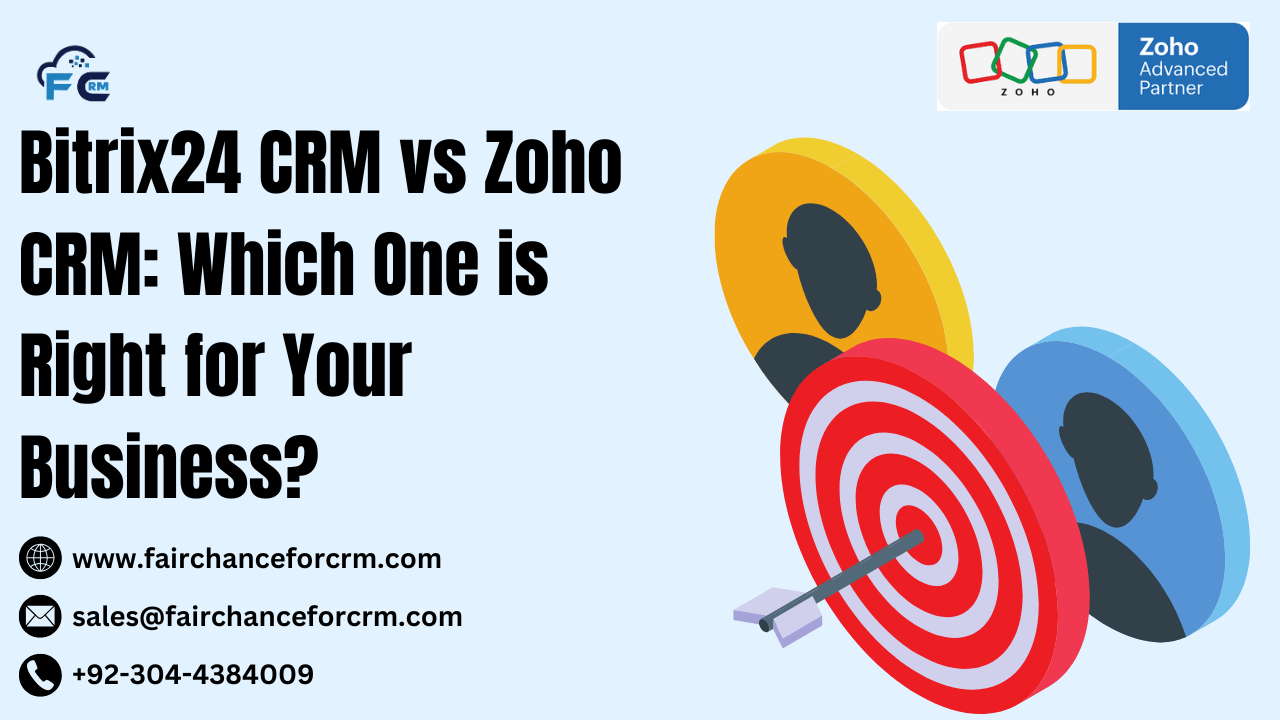When it comes to choosing the right CRM (Customer Relationship Management) solution, two of the most popular names in the market are Bitrix24 CRM vs Zoho CRM. Both platforms offer powerful tools to help businesses manage their customer relationships, automate workflows, and drive growth. However, they cater to slightly different needs and business models. In this article, we’ll explore and compare Bitrix24 CRM vs Zoho CRM, diving into their features, ease of use, integrations, pricing, and more, to help you make an informed decision about which CRM platform suits your business best.
Also Read:
- Infor CRM vs Zoho CRM: A Comprehensive Comparison
- Base CRM vs Zoho CRM: A Detailed Comparison
- Bullhorn CRM vs Zoho CRM: A Comprehensive Comparison
- PandaDoc CRM Vs Zoho CRM: A Detailed Comparison
- Ontraport CRM Vs Zoho CRM: A Comprehensive Comparison
Overview of Bitrix24 CRM vs Zoho CRM
Bitrix24 CRM:
Bitrix24 is an all-in-one business management platform that combines CRM functionality with project management, team collaboration, communication tools, and even HR features. Initially aimed at small businesses, Bitrix24 has grown into a more comprehensive tool for businesses of all sizes. The platform’s ability to integrate CRM with project management tools and internal communication features makes it stand out as a full-suite collaboration platform.
Key Features of Bitrix24 CRM:
- Contact and lead management
- Sales pipeline and task management
- Social media integration (Facebook, Instagram, LinkedIn)
- Marketing automation (email campaigns, lead nurturing)
- Team collaboration tools (internal chat, video conferencing, task management)
- HR features (employee directory, vacation tracking)
- Project management and time tracking
- File management and document sharing
Zoho CRM:
Zoho CRM is part of the larger Zoho suite, designed to help businesses manage their sales, marketing, and customer support processes. It’s known for its flexibility and customization options, providing users with a powerful platform for automating and optimizing customer interactions. With a robust set of features geared towards sales teams, Zoho CRM is an ideal choice for businesses looking for an advanced and scalable CRM solution.
Key Features of Zoho CRM:
- Lead, contact, and deal management
- Sales pipeline and workflow automation
- Multi-channel communication (email, social media, chat, phone)
- Advanced reporting and analytics
- Artificial intelligence (Zia) for insights and automation
- Customizable fields, dashboards, and modules
- Marketing automation tools (email campaigns, lead nurturing)
- Integration with other Zoho products and 500+ third-party apps
Feature Comparison: Bitrix24 CRM vs Zoho CRM
1. Sales and Lead Management
- Bitrix24 CRM:
- Bitrix24 offers a solid CRM core for managing contacts, leads, and opportunities. It includes customizable sales pipelines, deal tracking, and task management to help sales teams stay organized. The ability to manage everything from a contact’s initial inquiry to closing a deal in one platform is a major advantage.
- One standout feature is Bitrix24’s social CRM integration. It can capture leads directly from social media channels like Facebook, Instagram, and LinkedIn, helping businesses engage with prospects from multiple touchpoints.
- Zoho CRM:
- Zoho CRM excels in sales automation. It offers an extensive array of tools for managing leads, contacts, and deals, including advanced pipeline management, lead scoring, and lead nurturing capabilities. You can easily track the entire sales journey, from lead generation to deal closure.
- Zoho CRM’s Zia AI is one of its standout features. Zia can predict sales trends, provide intelligent recommendations, and even help with data entry and workflow automation, making it a great choice for businesses looking to optimize their sales processes with AI.
2. Marketing Automation
- Bitrix24 CRM:
- Bitrix24 provides basic marketing automation tools, including email campaigns, lead nurturing, and customer segmentation. It allows users to create simple automated workflows, but it may not be as advanced as some other platforms in terms of marketing features.
- It does integrate with social media platforms to capture leads, but its overall marketing automation tools are not as comprehensive as Zoho CRM’s offerings.
- Zoho CRM:
- Zoho CRM is much stronger when it comes to marketing automation. With tools like Zoho Campaigns and Zoho MarketingHub, users can run email campaigns, create landing pages, automate lead nurturing, and segment their audience.
- Zoho CRM’s integration with its own suite of marketing tools allows businesses to create highly targeted marketing campaigns, helping them to convert leads into customers efficiently.
3. Customer Support
- Bitrix24 CRM:
- Bitrix24 includes customer support tools, like a built-in helpdesk that allows businesses to manage customer support tickets. It also includes communication features such as live chat and team collaboration tools like task management and internal chat to support customer service teams.
- However, Bitrix24’s customer support features are not as comprehensive as Zoho’s, and it lacks advanced features like multi-channel support (helpdesk, ticketing, live chat).
- Zoho CRM:
- Zoho CRM integrates seamlessly with Zoho Desk, Zoho’s helpdesk platform, allowing businesses to manage customer support tickets, live chats, and help center requests. This integration ensures that customer queries are tracked and managed within the CRM itself.
- With multi-channel support, including email, social media, and phone, Zoho CRM provides a complete solution for both sales and customer support teams to work together and provide a seamless customer experience.
4. Project Management and Collaboration
- Bitrix24 CRM:
- Bitrix24 excels in offering a suite of collaboration and project management tools. It includes task management, project timelines (Gantt charts), time tracking, and document sharing, allowing teams to work together on projects while managing customer relationships.
- For businesses that need more than just CRM functionality, Bitrix24’s collaboration features make it an attractive option.
- Zoho CRM:
- While Zoho CRM offers basic task management and collaboration tools, it doesn’t provide as robust project management features as Bitrix24. Zoho users can integrate Zoho CRM with other Zoho apps, such as Zoho Projects, for more comprehensive project management capabilities.
5. Customization
- Bitrix24 CRM:
- Bitrix24 offers a good level of customization with features like customizable fields, sales stages, and reporting dashboards. However, the level of customization might be more limited compared to Zoho CRM, especially if you need advanced workflows or complex integrations.
- Zoho CRM:
- Zoho CRM is highly customizable, offering extensive options for custom modules, fields, workflows, and dashboards. Its flexibility allows businesses to tailor the CRM to their specific needs, and it can easily be adapted to a wide range of industries.
- The advanced customization options in Zoho CRM make it a great choice for businesses that need a more personalized CRM experience.
Ease of Use and User Interface
- Bitrix24 CRM:
- Bitrix24’s user interface can feel overwhelming due to the large number of tools and features it offers. While it’s intuitive once you get used to it, the learning curve can be steep, especially for new users who aren’t familiar with business management software.
- Its all-in-one nature may confuse users who just want a straightforward CRM.
- Zoho CRM:
- Zoho CRM has a more streamlined user interface. While it does have an abundance of features, it is generally considered to be user-friendly and easy to navigate. The learning curve is not as steep as Bitrix24’s, and Zoho CRM offers plenty of resources, including tutorials and guides, to help users get up to speed quickly.
Pricing Comparison – Bitrix24 CRM vs Zoho CRM
- Bitrix24 CRM:
- Bitrix24 offers a free plan for up to 12 users, which includes basic CRM features, task management, and collaboration tools. Paid plans start at $39/month (for 2 users) and go up from there. The pricing is competitive, especially for teams that need the combination of CRM and project management features.
- Zoho CRM:
- Zoho CRM offers a free tier for up to 3 users. Paid plans start at $14/user/month for the Standard plan, with higher-tier plans offering more advanced features like AI-powered analytics, marketing automation, and reporting.
- Zoho CRM is generally more affordable for small businesses, and its pricing is scalable based on the number of users and features needed.
Integrations
- Bitrix24 CRM:
- Bitrix24 integrates with a range of third-party applications, including Google Workspace, Microsoft Office 365, and Mailchimp. However, its integration ecosystem is not as expansive as Zoho’s.
- Zoho CRM:
- Zoho CRM excels in integrations, supporting over 500 third-party apps, including popular tools like Google Workspace, Microsoft Office 365, QuickBooks, and Mailchimp. Zoho’s integrations make it easy to connect with a variety of tools and streamline business operations.
Which One Should You Choose? Bitrix24 CRM vs Zoho CRM
- Choose Bitrix24 CRM if:
- You need an all-in-one business management solution with strong project management, collaboration, and CRM features.
- Your team needs internal communication tools like chat, video calls, and document management, alongside CRM functionality.
- You’re a small-to-medium-sized business looking for an affordable and flexible solution.
- Choose Zoho CRM if:
- You need a robust, scalable CRM that excels in sales and marketing automation, reporting, and AI-powered insights.
- You require advanced customization options and integrations with a wide range of tools and apps.
- You need a CRM that focuses primarily on customer relationships and sales automation, with seamless integrations into other business systems.
Conclusion
Both Bitrix24 CRM vs Zoho CRM are powerful tools, but they serve different types of businesses. Bitrix24’s strength lies in its comprehensive suite of collaboration tools, making it a great choice for businesses that need a combination of CRM and project management. Zoho CRM, on the other hand, offers a more specialized, flexible CRM platform focused on sales and marketing automation, making it ideal for businesses that want advanced features and integrations.
Ultimately, your decision should depend on the specific needs of your business, whether you’re looking for an all-in-one business solution or a dedicated, scalable CRM system.
For more information about the Bitrix24 CRM vs Zoho CRM: visit this link.
If you want to Free Trail Zoho, click on this link.




